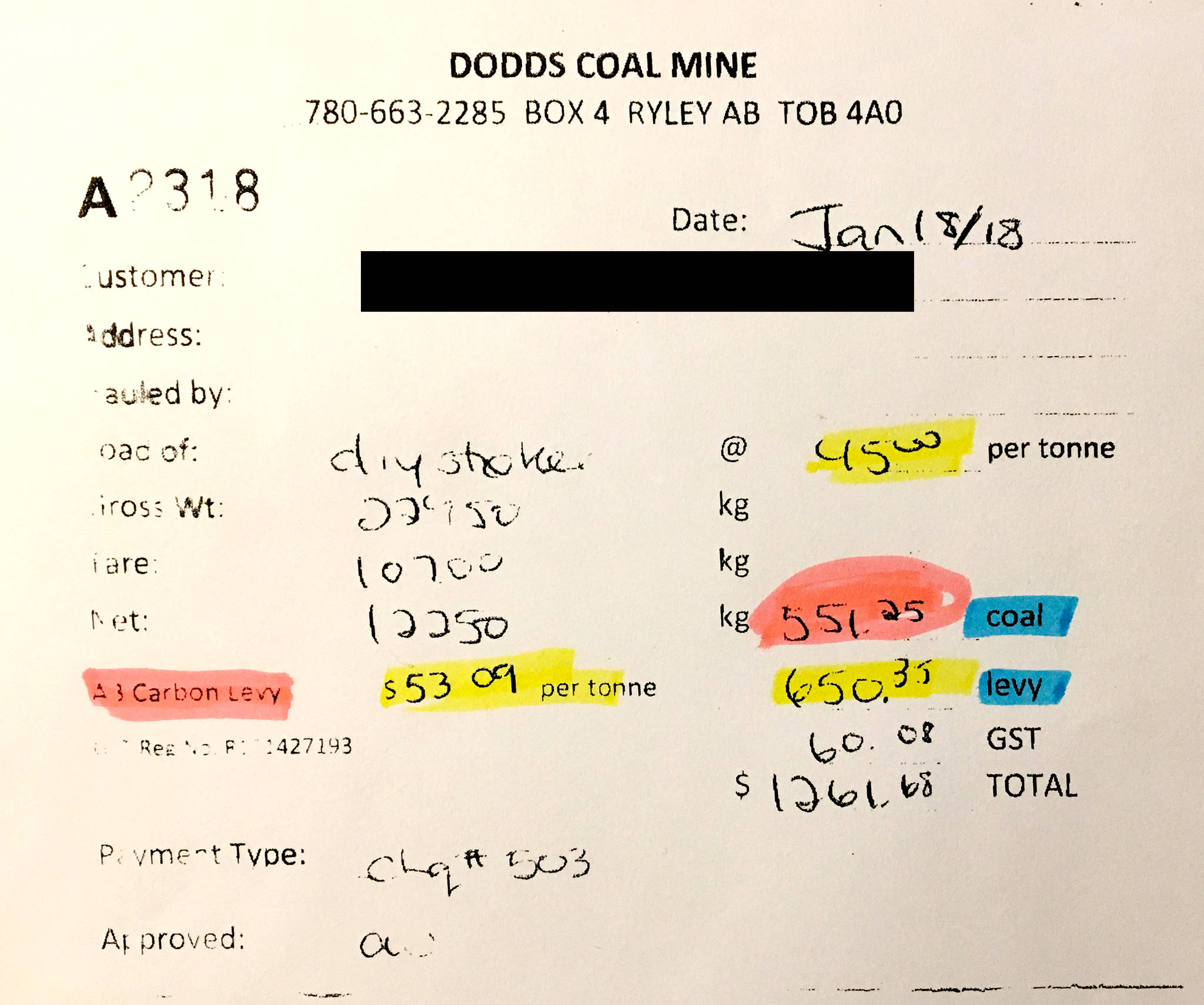A Ponoka farmer wasn’t pleased to see the carbon levy for his heating coal cost more than the coal itself.
When Lawrence McKelvie bought just 12.25 tonnes of low heat value coal from Dodds Coal Mine he ended up paying $1,261.68; the levy cost $650.35 ($53.09 per tonne) and the coal cost $551.23 ($45 per tonne). GST was added after.
McKelvie buys coal about four to five times per year and the increased costs are becoming a source of frustration.
For close to 27 years McKelvie has heated his home and farm with coal using a high-efficiency coal heater. This system brings heat from a separate building and warms several homes plus a few barns on the farm north of town.
“It generates heat for the farm very economically,” said McKelvie, adding that he doesn’t have to deal with power companies to use the coal.
The carbon levy is calculated based on the gigajoules (GJ) of energy it creates
According to a Statistics Canada handbook, one tonne coal equivalent (TCE) equals 29.3 GJ. For a barrel of crude oil there is a difference: one barrel of crude oil equals 6.193 gigajoules.
The province’s levy was created to reduce the use of high-emissions fuels, in this case, coal emissions are relatively high.
In an effort to find some cost-savings, McKelvie said he is considering looking at gas or electric heating. While he doesn’t have a concrete price for the connection he anticipates it’ll run about $30,000 to $40,000.
“What chokes me is if we’re going to brand coal this way, why do we not charge $53 a tonne for every train load that goes for export?” he asked.
McKelvie asked that same question to Wetaskiwin-Camrose MLA Bruce Hinkley (NDP) but was told that it’s a commercial entity that could not be meddled with as it is an export commodity.
Alberta coal exports could bring in millions
A request to the province to determine coal export amounts brought answers from the Office of the Minister of Environment and Parks.
The province confirmed that there is no carbon levy applied to outside jurisdictions.
“Coal sold for export is exempt from the levy as it is not consumed in Alberta and the related emissions are not released here,” states press secretary Matt Dykstra in an email.
In 2014, the province exported 2.8 million tonnes of thermal coal (mainly used for heating), in 2015 it was 2.05 million tonnes and in 2016 it was 2.04 million.
If thermal coal is calculated at the same rate McKelvie paid, the province would have received $106.5 million in coal levy revenues for 2016.
The carbon levy was at $35.39 per tonne in 2017 and those export numbers were not available for this calculation.
Adding metallurgical coal (best used for steel manufacturing) to the exports, the province saw 6.06 million total tonnes in 2014 exported, 4.2 million 2015 and 3.7 million. Almost a 50 per cent drop from 2014.
The province responds to carbon levy concerns
In Alberta, coal buyers and sellers have no choice but to work with the levy, which has caused much uncertainty for those in the industry.
Indeed, McKelvie said coal mines have had to mark up their coal rates as they too are paying a carbon levy for the energy they produce. In speaking with Dodds Coal Mine, McKelvie says they are as frustrated as he is. “They have lost half their Alberta customers because of this.”
“They’re still shipping coal steadily to Saskatchewan and Manitoba because they don’t have these ridiculous rules, yet,” stated McKelvie.
His other concern is having to reinvest money into a new heating system, something he is reluctant to do considering the investment needed.
Dykstra pointed out there is a rural gas program that is a partnership with Alberta Agriculture and Forestry. The province pays for 75 per cent of gas-line installation over $7,000 up to $20,000.
Another issue McKelvie has with his bill is the GST applied to the levy.
According to Dykstra the province has no say in the GST rates as it’s applied to nationwide but for McKelvie’s part, it’s just another tax that’s hurting the little guy.



